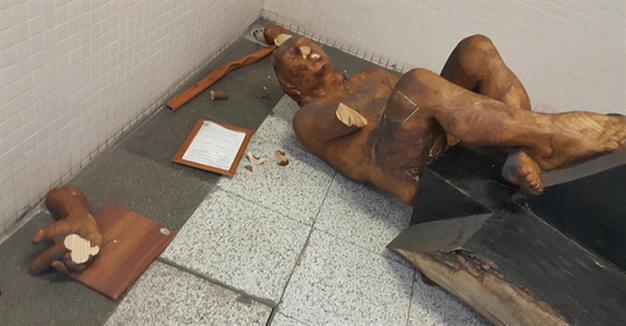İzmir municipality pledges to re-erect naked ‘Musician’ statue
Nazlan Ertan - nazlanertan@gmail.com
 The İzmir Metropolitan Municipality has announced that it will repair and re-erect a wooden statue in the Aegean province which was attacked by a local man for “being obscene.”
The İzmir Metropolitan Municipality has announced that it will repair and re-erect a wooden statue in the Aegean province which was attacked by a local man for “being obscene.”“This cannot be the İzmir I know,” tweeted Mayor Aziz Kocaoğlu, along with a photo of the destroyed statue. “We will restore it again.”
Within hours the hashtag “thestatuewillbereerected” became a trending topic, with a great number of İzmir residents and outsiders condemning the attack and asking for the wooden statue, the award winner of a 2012 international sculpture workshop, to be reinstalled as soon as possible.
“The statue will be reinstalled,” tweeted the İzmir Metro Administration, adding “whatever it takes.”
The last three words may be read as foreshadowing on future measures to protect the statue from further attacks. The statue, which had peacefully been on display at the city’s İzmirspor metro station for four years, became controversial over the last month.
Background of controversy
In April, Emrullah Kavuz, a member of the municipal council for the district of Karabağlar from the Justice and Development Party (AKP), held an unauthorized demonstration at the metro to cover the genitals of the statue with a white cloth. “This is a Muslim country, with its own ethics and moral values,” he said. “There are women and children who pass here every day and they do not have to see this. Shame on you, Mayor Kocaoğlu, to keep it here. If you want to look at this, you could take the statue and look at it with your family.”
Right after the demonstration, the İzmir Metro Administration made a statement, sounding somewhat surprised that the statue had suddenly become controversial after four years. “This is a statue that has been seen by hundreds of people every year. There has not been any unease expressed.”
The next step in the controversy came when a 98-years-old man claimed to have come from the province of Erzurum in eastern Turkey to cover the statue a week ago. Accompanied by Kavuz, the genitals of the statue were again covered with a cloth, this time with a chain so it could not be removed.
“Our demonstrations will continue until the mayor removes this statue that offends the public with its display of genitals,” Kavuz said.
“This is İzmir and the Aegean, where 10-year-olds are taken to Ephesus as part of their school curriculum,” a municipality administrator told Hürriyet Daily News, on condition of anonymity. “I do not believe that any child or woman saw a naked statue for the first time at the metro station.”
Re-erecting the statue
Meanwhile, the artist who sculpted the statue in 2012, Amani Gonzalez Andres, condemned the attack on his work as “a sign of regressivism in Turkey.” Speaking to daily Birgün newspaper, Andres said he would be taking part in the restoration of the statue.
The sculpture was made within the scope of the International Sculpture Competition with the theme “Mediterranean” in 2012. The İzmir Metropolitan Municipality organizes a competition every year to ensure that works of local and foreign artists are put on display in the city and the jury consists of academics, sculptors and urban experts, who later work with the municipality on where to place the statues.
“One of these 12 works, Spanish artist Amancio Gonzales Andres’ mythological sculpture ‘Musician,’ had been on display there for more than four years, accompanied by an informative panel,” the İzmir Metro Administration said.
Some İzmir residents have started a petition at change.org asking the municipality to erect a statue of Priapus, a god of fertility with huge genitals, “to show the reaction of İzmir to the vandals.” The petition reached some 2,000 supporters.
Various statues have been removed in Turkey in the last year on claims of being obscene. Two months ago, the AKP municipality removed some female statues, while were also winners of an international competition, saying they “conflicted with public morals.”
















